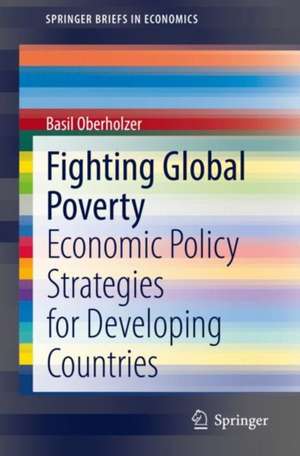Fighting Global Poverty: Economic Policy Strategies for Developing Countries: SpringerBriefs in Economics
Autor Basil Oberholzeren Limba Engleză Paperback – 16 mar 2022
It is, therefore, a must-read for policy-makers and practitioners working on fighting global poverty, as well as scholars and students of economics, interested in a better understanding of development economics, economic growth, and financial economics.
Din seria SpringerBriefs in Economics
-
 Preț: 444.35 lei
Preț: 444.35 lei -
 Preț: 264.79 lei
Preț: 264.79 lei - 15%
 Preț: 462.51 lei
Preț: 462.51 lei -
 Preț: 47.33 lei
Preț: 47.33 lei -
 Preț: 353.14 lei
Preț: 353.14 lei -
 Preț: 273.32 lei
Preț: 273.32 lei -
 Preț: 376.04 lei
Preț: 376.04 lei -
 Preț: 379.09 lei
Preț: 379.09 lei -
 Preț: 380.07 lei
Preț: 380.07 lei -
 Preț: 377.35 lei
Preț: 377.35 lei -
 Preț: 379.09 lei
Preț: 379.09 lei -
 Preț: 376.59 lei
Preț: 376.59 lei -
 Preț: 408.27 lei
Preț: 408.27 lei -
 Preț: 379.09 lei
Preț: 379.09 lei -
 Preț: 383.28 lei
Preț: 383.28 lei -
 Preț: 378.54 lei
Preț: 378.54 lei -
 Preț: 377.95 lei
Preț: 377.95 lei -
 Preț: 340.23 lei
Preț: 340.23 lei -
 Preț: 380.25 lei
Preț: 380.25 lei -
 Preț: 378.12 lei
Preț: 378.12 lei -
 Preț: 376.04 lei
Preț: 376.04 lei -
 Preț: 376.04 lei
Preț: 376.04 lei -
 Preț: 379.68 lei
Preț: 379.68 lei -
 Preț: 381.00 lei
Preț: 381.00 lei -
 Preț: 375.23 lei
Preț: 375.23 lei -
 Preț: 376.80 lei
Preț: 376.80 lei -
 Preț: 378.54 lei
Preț: 378.54 lei -
 Preț: 377.57 lei
Preț: 377.57 lei -
 Preț: 376.04 lei
Preț: 376.04 lei -
 Preț: 378.92 lei
Preț: 378.92 lei -
 Preț: 375.62 lei
Preț: 375.62 lei -
 Preț: 379.09 lei
Preț: 379.09 lei -
 Preț: 353.67 lei
Preț: 353.67 lei -
 Preț: 342.14 lei
Preț: 342.14 lei -
 Preț: 375.45 lei
Preț: 375.45 lei -
 Preț: 379.09 lei
Preț: 379.09 lei -
 Preț: 377.35 lei
Preț: 377.35 lei -
 Preț: 344.86 lei
Preț: 344.86 lei -
 Preț: 377.35 lei
Preț: 377.35 lei -
 Preț: 345.89 lei
Preț: 345.89 lei -
 Preț: 377.57 lei
Preț: 377.57 lei -
 Preț: 343.83 lei
Preț: 343.83 lei -
 Preț: 378.12 lei
Preț: 378.12 lei -
 Preț: 345.06 lei
Preț: 345.06 lei -
 Preț: 379.48 lei
Preț: 379.48 lei -
 Preț: 379.48 lei
Preț: 379.48 lei -
 Preț: 380.07 lei
Preț: 380.07 lei -
 Preț: 375.45 lei
Preț: 375.45 lei -
 Preț: 445.33 lei
Preț: 445.33 lei -
 Preț: 378.54 lei
Preț: 378.54 lei
Preț: 410.55 lei
Nou
Puncte Express: 616
Preț estimativ în valută:
78.57€ • 81.72$ • 64.86£
78.57€ • 81.72$ • 64.86£
Carte tipărită la comandă
Livrare economică 14-28 aprilie
Preluare comenzi: 021 569.72.76
Specificații
ISBN-13: 9783658366308
ISBN-10: 3658366303
Pagini: 97
Ilustrații: IX, 97 p. 1 illus.
Dimensiuni: 155 x 235 mm
Greutate: 0.16 kg
Ediția:1st ed. 2022
Editura: Springer Fachmedien Wiesbaden
Colecția Springer
Seria SpringerBriefs in Economics
Locul publicării:Wiesbaden, Germany
ISBN-10: 3658366303
Pagini: 97
Ilustrații: IX, 97 p. 1 illus.
Dimensiuni: 155 x 235 mm
Greutate: 0.16 kg
Ediția:1st ed. 2022
Editura: Springer Fachmedien Wiesbaden
Colecția Springer
Seria SpringerBriefs in Economics
Locul publicării:Wiesbaden, Germany
Cuprins
Chapter 1. Introduction.- Chapter 2. Are Current Policies on Track to Eliminate Poverty?.- Chapter 3. How Mainstream Economics Works.- Chapter 4. Basic Principles to Understand Macroeconomics.- Chapter 5. Markets Alone Make No Development.- Chapter 6. Developing Countries in Global Capitalism.- Chapter 7. Reclaiming Economic Policy.- Chapter 8. Macroeconomics for Development.- Chapter 9. Economic Growth Forever?.- Chapter 10. New Perspectives.
Notă biografică
Basil Oberholzer received his Ph.D. from the University of Fribourg, Switzerland, and is currently an associated researcher at the Centre for Development and Environment at the University of Bern, Switzerland. His research focus is on monetary economics, development macroeconomics and ecological economics. Moreover, Basil is an economic officer at the Global Green Growth Institute, which supports governments and other stakeholders in developing countries regarding decarbonization strategies and green economic policies. His main publications include the books “Monetary Policy and Crude Oil: Prices, Production and Consumption” as well as “Development Macroeconomics: Alternative Strategies for Growth” at Edward Elgar Publishing.
Textul de pe ultima copertă
This book presents paths developing countries can pursue in order to reclaim their ability to take action and improve people’s living conditions in the long term. According to dominant economic theory, markets are the essential engines of growth and poverty reduction in developing countries. However, the track record so far is disappointing. On the other hand, poor countries, which are exposed to the dynamics of global capitalism, have little chance to implement alternative development strategies. Policy actions for a fairer income distribution or for more public investment run the risk of being punished by financial markets and capital flight. The book presents solutions to these issues, considering key economic foundations, and outlining feasible development strategies.
It is, therefore, a must-read for policy-makers and practitioners working on fighting global poverty, as well as scholars and students of economics, interested in a better understanding of development economics,economic growth, and financial economics.
It is, therefore, a must-read for policy-makers and practitioners working on fighting global poverty, as well as scholars and students of economics, interested in a better understanding of development economics,economic growth, and financial economics.
Caracteristici
Presents practical and historical examples from different countries around the world Pins macroeconomic theory down to very few principles Suggests a policy reform of countries’ payment systems
